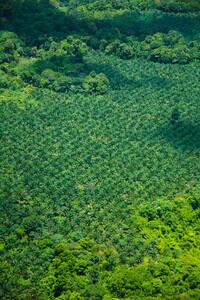The announcement comes as forest fires continue to burn across large swathes of Indonesia's forests and peat lands, although the arrival of monsoon rains which have dampened fires in some hot spots.
Except under exceptional circumstances, the RSPO operates a no-fire policy on its members' plantations, and monitors compliance with this policy by studying data provided by the Global Forest Watch (GFW). But because there is no single up-to-date database of palm oil plantations, the data is not 100% accurate.
“Disclosure of the actual up-to-date map data will therefore help create a single reference point for all stakeholders that are involved in monitoring and reporting hot spots. It will facilitate the fire reporting and verification process and provide an incentive for RSPO plantation owners to improve their fire prevention efforts,” it says.

The information will be made publically available in the second quarter of 2016 via the Global Forest Watch Platform.
The commitment to publish member maps was taken at a 2013 general assembly but was challenged by Malaysia and Indonesia, meaning the plans were put on hold until now. The move comes after extensive discussions and will apply to all RSPO members bar Malaysia, which has refused on the grounds that the maps represent commercially sensitive information and may therefore fall under the country’s Official Secrets Act.
Not all RSPO palm oil covered
Greenpeace said it is pleased with the announcement but said the plan only covers concessions directly owned by members, rather than the extensive supply base for oil traded by RSPO members, and called on the RSPO to publish maps of all concessions linked to groups supplying member companies, whether directly owned by members or not.
Campaigner for the Indoensian arm of the NGO Annisa Rahmawati said: “The the major issue remains the maps for those companies that RSPO members buy oil from. Until concession maps are available for all supplier operations, the impact will be very limited, and trade in sustainable palm oil will remain an elusive goal.”
Limitations
Greenpeace has questioned whether sanctions will apply to members that fail to comply.
But the RSPO is the first to admit the limitations of the measure.
“Of course, this new database will have some limitations. It will only affect the RSPO members’ concession maps so map data of palm oil growers which are not RSPO members will remain unavailable to the public,” Stefano Savi, RSPO’s Global Outreach and Engagement Director told FoodNavigator.
“It should not also be regarded as the ultimate solution to the problem of forest fires. Only a combination of actions from all stakeholders, including local government, and strong commitment from all palm oil growers, both RSPO and non-RSPO members, to implement fire prevention measures can significantly reduce the occurrence of forest fires in the region.”
A Greenpeace report Under Fire, the NGO said the RSPO’s secrecy in failing to publish member maps despite the 2013 pledge – was encouraged by the Indonesian Ministry of Agriculture in a letter to Indonesian RSPO palm growers which allegedly forbade them from making such public disclosures.
The RSPO says it has been working closely with the Department of Survey and Mapping Malaysia (JUPEM) in a bid to get the country on board but, to its knowledge, only the Malaysian Cabinet can grant approval to publish the country’s plantation maps.
According to the NGO, one quarter of Indonesia’s forests have been destroyed since 1990 with the paper and palm oil industries the leading drivers of forest loss.
